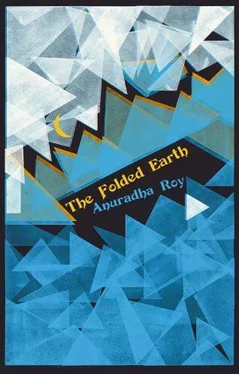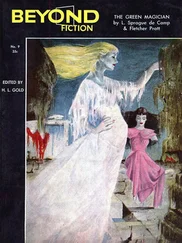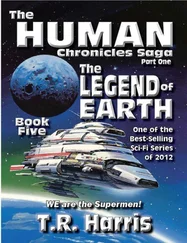After a while I picked my head up, swallowed my mud-cold coffee and decided I would visit Michael’s grave. If I went to his grave and talked to him I would calm down and the knot in my throat, which had come to live there since the evening before, would dissolve. I would pay that overdue bill on the way.
I walked down to the electricity office by various shortcuts past the backs of people’s houses. Past Tiwari, the plumber, who raised his hands in a Namaste; past three lumbering olive-green army trucks, each one as big as my bedroom; past the sign that said Military Area, You May be Questioned; past the soldiers who stood at attention all day at the gates of the officers’ mess; past Mr Qureshi, who rolled down his car’s window and told me a long story about how he was driving around house-hunting for relatives who had been given an eviction notice. “It is impossible, there’s not even a tin shed to be found, Maya. You’d find gold hidden under a tree in Ranikhet more easily than a place to live in.” I tried to hurry away from Pande, the hobbling old advocate, but he stopped me and said with a worried look, “Where to, Maya Mam, where to? Tell me, did you know there is a London in Canada also? Do you think that somewhere else in the world there is another Ranikhet? What is real in this world, Mam, can you tell me? Till last week I thought Timbuctoo was not a real place. Then my grandson — he is only seven, you know and this little one already knows much more than me! — he says, ‘No Dadaji, it’s a city in China!’ Child is the Grandfather of Man, I feel it truer every day.”
By the time I had paid the bill, reached the low wall that crumbled around the graveyard, and walked under the stone archway towards Michael, my headache had turned into hammer blows. I reached the grave in a mist of pain, hardly able to open my eyes or see straight. I thought I had walked by mistake to the wrong grave and began to stumble away, when I stopped and looked at the headstone again. It was the right one, of course — low, dark, square, inscribed with Michael’s name, and the words “ever after” — a modest stone with no decoration. At this moment, it had one broken bottle on it and another empty bottle propped against it. Shattered glass lay all around the grave. The day lilies I had planted had been dug out and thrown aside, their long leaves wilted, their light-starved tubers helpless under the sun. Some of the plants had buds on them, some had shrivelled flowers.
The day I buried that tin of ashes there and planted the bulbs, I had had nobody for company but Miss Wilson. She had not thought it worth while to summon the church gravediggers for my small tin, so she had stood by, reading aloud from her Bible, her dull voice reducing the beautiful words to monotonous rubble as I dug with a kutala, an implement whose curved blade I was then unused to. It had been a cold day, with a clammy, grey wind that swept through the pines around the cemetery. The earth was frost-hardened. Nearby was a nettle bush which set my skin on fire if I brushed against it. Mrs Wilson interrupted her reading occasionally to say, “Deeper, deeper. At least three feet.” Her double chins wobbled, and the large mole under her right eye, which sprouted hair, seemed to twitch. She sucked on her buck teeth, making a kissing sound as she read. Though I knew she was there out of compassion and was trying to help, I felt a concentration of hatred for her such as I had not felt before for anyone. The burial had taken more than an hour — she had noted the time on the round gold watch she wore on her right wrist. It had belonged to her maternal grandfather from Kozhikode, she told me that morning, he was once the Collector and this was his retirement present. At intervals she said, “It is eleven. This watch has never been wrong in six-tee years. You have taken half an hour already. We should have brought the gardener with us after all. I thought you’d be able to dig a simple hole. I would do it faster.” But she did not once offer to take over the digging.
In a heart-stopping flash the thought crossed my mind that the tin with Michael’s ashes had been dug out and flung away as the lilies had been. It must have rusted by now, or disintegrated altogether. What if vandals had thrown it down the valley? I went this way and that in a panic, looking for the tin; then decided I was being irrational, that the tin must still be where I had put it: three feet down, as Miss Wilson had insisted. The vandals had not dug so deep, I could see that. I began to gather the lily bulbs from all around the grave to replant them.
* * *
On my way back from the graveyard, when I reached Mall Road, I saw Mr Chauhan standing at the fork of the road leading down towards the Light House. I was tired and aching; my clothes were filthy and my fingernails black and split from returning the lily bulbs to their places with my bare hands. Mr Chauhan did not seem to notice my dishevelled condition. He was studying one of his signs, which said, “Don’t Drive Rash, You Will Crash”. The yellow paint still glistened wetly on the dark rockface. He swayed back on his heels and tilted his head for a different view, caressing his thin moustache with a smile of satisfaction. I had not noticed the purple birthmark by his ear before. It was shaped like Australia.
When he saw me, he smiled. “Ah Mam, as you see, I’m doing what I can for our town. I think it has potential, but nobody has known how to tap it. This could be a great tourist destination. I am going to beautify it from top to bottom before the Regimental Reunion in November.”
“What needs beautifying is the graveyard,” I said. “Have you ever been there?” I knew I sounded short, but could not help my tone.
“These signs, you see,” Mr Chauhan went on, as if I had not spoken. “Daily you will pass them, without thinking you will read them, and slowly — what will happen?” He smiled in triumph. “They will start altering your mind. You will begin to think differently. I don’t mean you, of course, you are a good citizen. I mean all these … “ He waved an arm over all the landscape. “All these wretched villagers, their dirty children … they have to learn.” The grass along the side of the road was strewn with plastic cups, beedi wrappers, and deflated foil packets that had once contained fries and gutka. He poked at the rubbish with a stick and said, “No civic sense, I tell you, none. This road was swept only last week.” Then he spotted Charu at a distance, slapping the rump of a cow to make it move. Instead it raised its tail and let out great dollops of dung that steamed in the cool air.
“That is exactly what I mean,” Mr Chauhan said. “Disgusting, disgusting! Is this what an army cantonment should be filled with? Dung?”
Charu threw us a guilty look over her shoulder, as if she had overheard Mr Chauhan, and harried her animals to make them go down the hillside, out of sight. She gave me a quick, apologetic smile as she passed us and tugged at Bijli’s collar to make him follow her. He had other plans.
“I went to the graveyard,” I said, trying to control the tremor in my voice. “And not only was my husband’s grave vandalised, I saw that the wings of the angels on one of the colonial graves have been broken — smashed deliberately. Many of the graves had rubbish on them. The wall around the graveyard is broken.”
Mr Chauhan said, “Do you know what I think the real problem of the Indian state is?” He paused for effect. “We are too soft, far too soft on everything. Just as we are with terrorists. They keep dropping bombs here and there and what do we do about it? Nothing. And here? Same thing, different situation. All anti-socials. These cows, dumping dung, is anyone able to stop them?”
He was startled into silence by a voice exclaiming in foreign accents, “Oh look ! Another foraging party!” We had not noticed the bearded man who had stationed himself on the grassy slope below, with binoculars round his neck. He was pointing them skyward at a flock of passing birds. A backpacked woman stood next to him, staring up through an identical pair of binoculars.
Читать дальше












